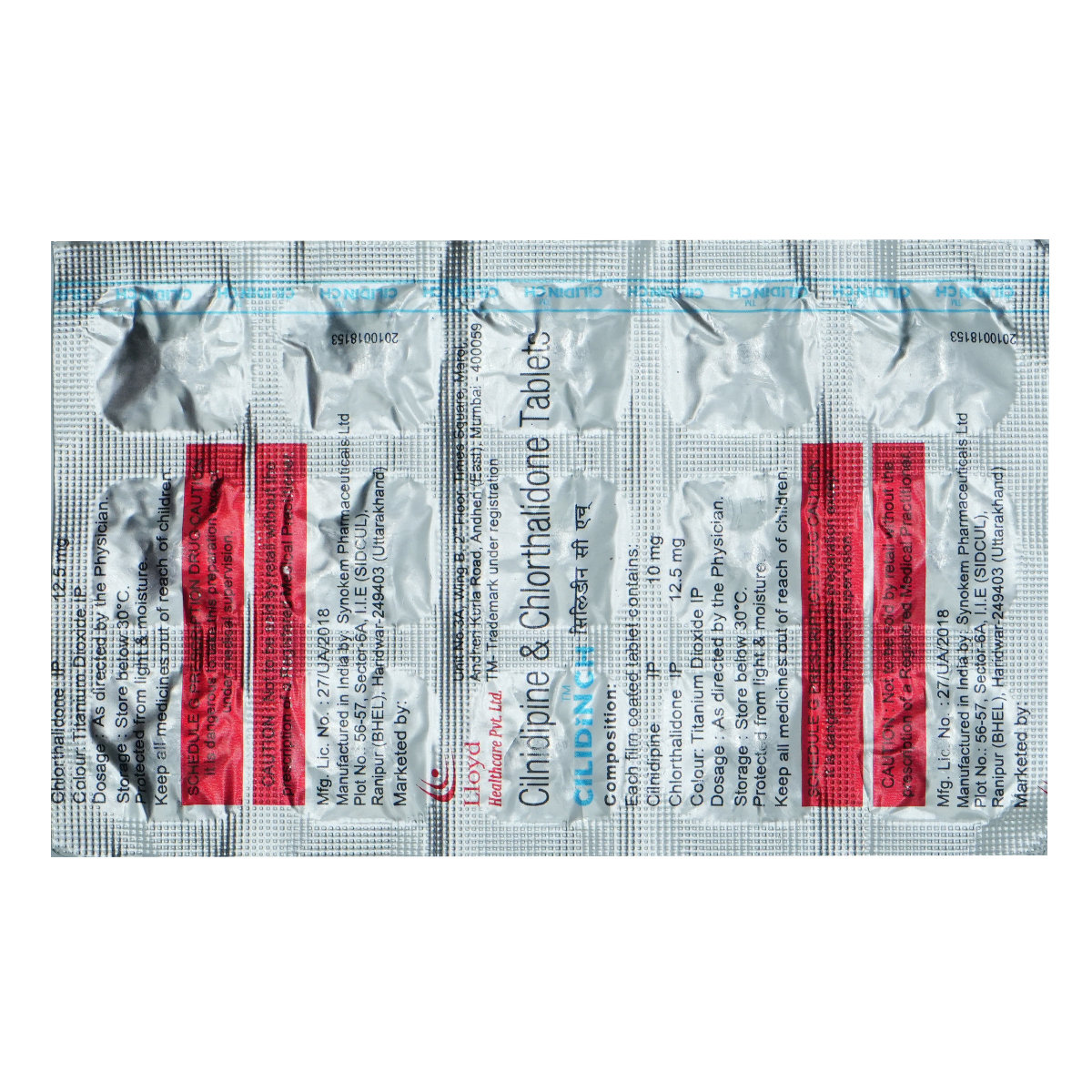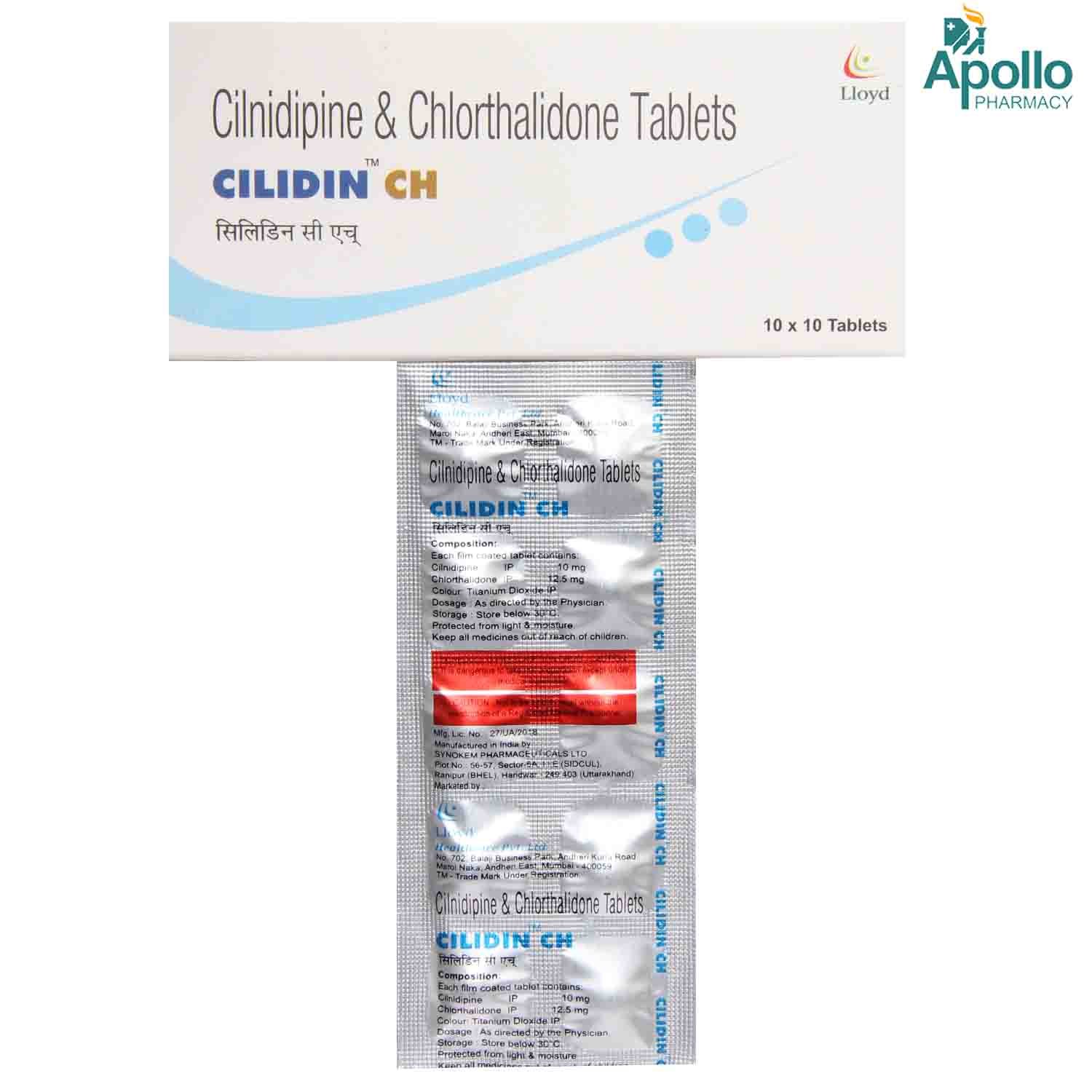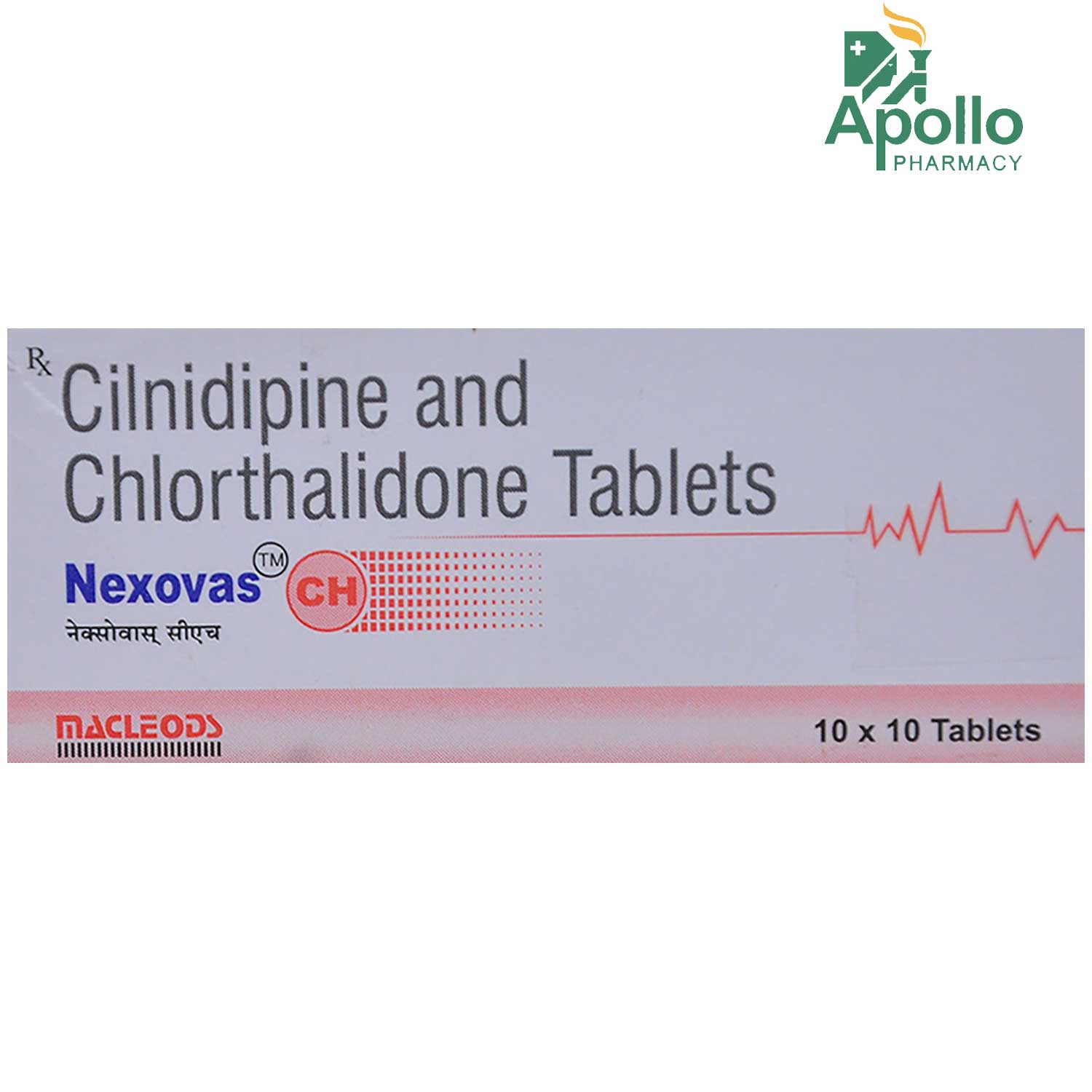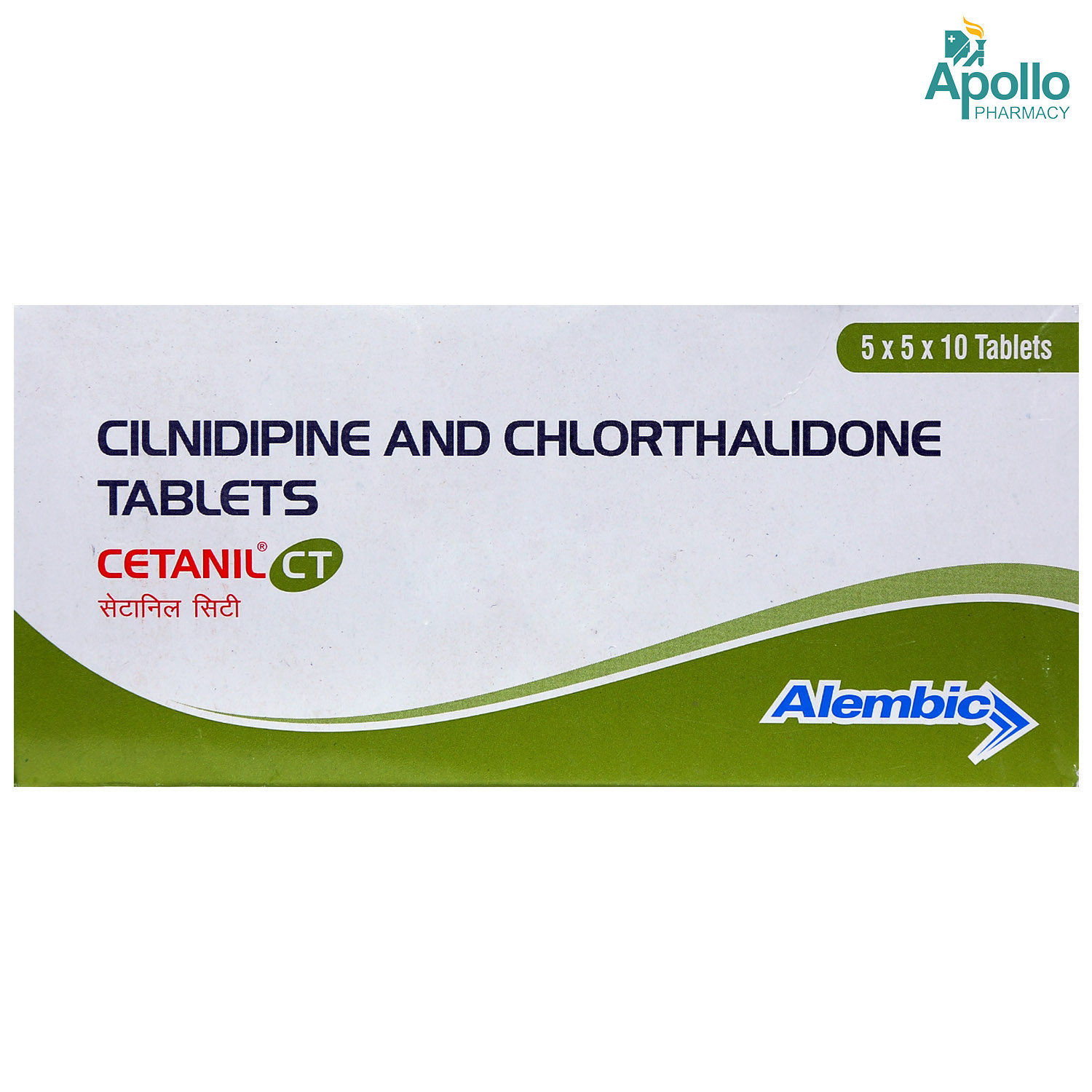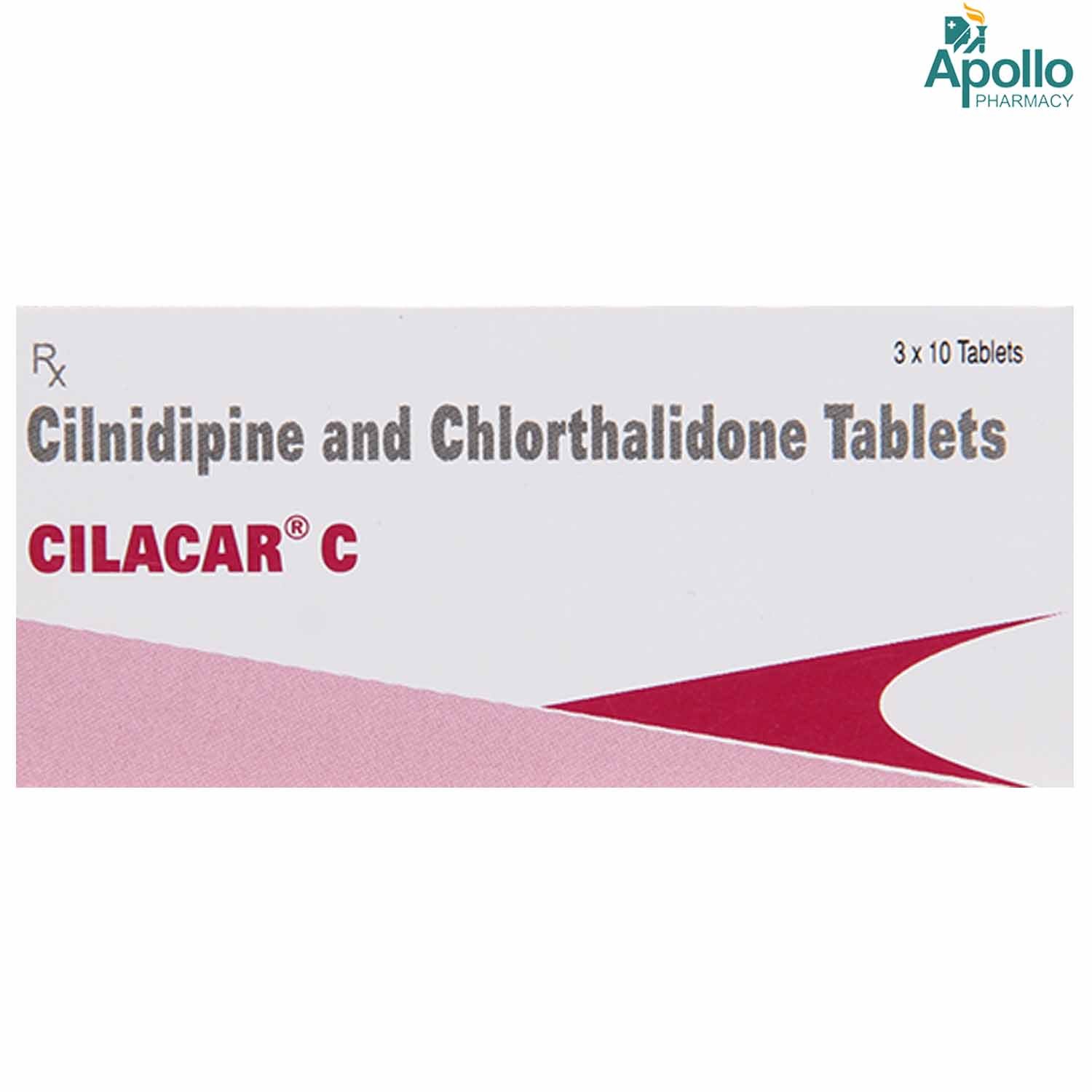CNDP-Plus Tablet 10's
MRP ₹199.5
(Inclusive of all Taxes)
₹29.9 Cashback (15%)
Provide Delivery Location
Online payment accepted
 Prescription drug
Prescription drugWhats That
Composition :
Manufacturer/Marketer :
Consume Type :
Expires on or after :
Return Policy :
About CNDP-Plus Tablet
CNDP-Plus Tablet belongs to the class of medications called ‘antihypertensives’ used to treat hypertension (high blood pressure). Hypertension is a lifelong condition in which there is a persistent rise in blood pressure. The rise in blood pressure occurs when the force exerted by the blood against the blood vessel (arteries wall) increases. The higher this blood pressure, the harder the heart has to pump. As a result, it leads to heart diseases, irregular heartbeat, and other complications.
CNDP-Plus Tablet is a combination of two medicines: Cilnidipine and Chlorthalidone. Cilnidipine blocks the calcium channels present in the blood vessels of the heart. This effect widens the blood vessels lowering the pressure exerted by the blood on the walls of blood vessels. It decreases the workload on the heart. It also reduces the risk of heart attack or stroke. Chlorthalidone is a diuretic or water pill. It acts by getting rid of excess water and salts in the body by increasing urination, thereby reducing blood pressure. It helps to reduce edema (fluid buildup) and swelling associated with hypertension.
You should take this medicine as prescribed by your doctor. The common side-effects of CNDP-Plus Tablet are low blood pressure (feeling light-headed), dizziness, headache, palpitations (racing or pounding heart), increased frequency of urination, lethargy (lack of energy), peripheral edema (swelling of legs/hands), flushing (skin reddening), rash, impotence (erectile dysfunction), and gingival hyperplasia (gum overgrowth). Inform your doctor if any of these side-effects persist or get worsen.
Do not take CNDP-Plus Tablet if you are allergic to Chlorthalidone, Cilnidipine, or any other ingredients present in it. Do not take CNDP-Plus Tablet if you are unable to urinate or allergic to sulfa drugs. Before taking CNDP-Plus Tablet , inform your doctor if you have kidney disease, heart failure, diabetes, gout (a type of arthritis), high cholesterol, aortic stenosis (narrowing of the aortic valve), cardiogenic shock (sudden stopping of blood flow to the heart), or if you are on a low-salt diet. Also, inform your doctor if you are pregnant or breastfeeding.
Uses of CNDP-Plus Tablet
Directions for Use
Key Benefits
CNDP-Plus Tablet is a combination of two medicines: Cilnidipine and Chlorthalidone. Cilnidipine blocks the calcium channels present in the blood vessels of the heart. This effect widens the blood vessels lowering the pressure exerted by the blood on the walls of blood vessels. It decreases the workload on the heart. Chlorthalidone is a diuretic or water pill. It acts by getting rid of excess water and salts in the body by increasing urination, thereby reducing blood pressure. It helps to reduce edema (fluid buildup) and swelling associated with hypertension. Together, CNDP-Plus Tablet can effectively reduce the blood pressure and the complications associated with this condition such as heart attack.
Storage
- Consume controlled amounts of salt to raise sodium levels.
- Eat fresh fruits like apples, berries, oranges, mangoes, and bananas.
- Include fresh vegetables like broccoli, sweet potatoes, beets, okra, spinach, peppers, carrots, and edamame.
- Choose frozen vegetables without added butter or sauce.
- Drink electrolyte beverages like sports drinks or electrolyte solutions to replenish sodium and other electrolytes.
- Avoid excessive salt intake, but allow for controlled increases as needed.
- Monitor and manage underlying health conditions that may contribute to hyponatremia.
- Avoid trigger foods that can cause allergic reactions, such as nuts, shellfish, or dairy products.
- Keep a food diary to track potential food allergens.
- Include omega-3 rich foods like salmon and walnuts to reduce inflammation.
- Wear loose, comfortable clothing made from soft fabrics like cotton.
- Apply cool compresses or take cool baths to reduce itching.
- Use gentle soaps and avoid harsh skin products.
- Reduce stress through relaxation techniques like meditation or deep breathing.
- Inform your doctor about dizziness symptoms. They may adjust your medication regimen or prescribe additional medications to manage symptoms.
- Follow your doctor's instructions for taking medication, and take it at the same time every day to minimize dizziness.
- When standing up, do so slowly and carefully to avoid sudden dizziness.
- Avoid making sudden movements, such as turning or bending quickly, which can exacerbate dizziness.
- Drink plenty of water throughout the day to stay hydrated and help alleviate dizziness symptoms.
- If you're feeling dizzy, sit or lie down and rest until the dizziness passes.
- Track when dizziness occurs and any factors that may trigger it, and share this information with your doctor to help manage symptoms.
Drug Warnings
CNDP-Plus Tablet may cause electrolyte imbalances (low levels of potassium, sodium, or magnesium in your blood). So, consult your doctor immediately if you have vomiting or diarrhoea, as CNDP-Plus Tablet used in this condition may lead to severe dehydration. Your doctor may perform blood and urine tests to monitor electrolyte levels. CNDP-Plus Tablet may cause dizziness, so avoid rising up too fast from a sitting or lying position. Stay hydrated and avoid hot weather as CNDP-Plus Tablet increases the frequency of urination. Do not stop taking CNDP-Plus Tablet abruptly, as it may increase the risk of a heart attack.
Drug-Drug Interactions
Drug-Drug Interactions
Login/Sign Up
Co-administration of CNDP-Plus Tablet and cisapride may increase the risk or severity of an irregular heart rhythm that may be serious.
How to manage the interaction:
Taking CNDP-Plus Tablet with Cisapride is not recommended, please consult your doctor before taking it. Do not discontinue the medication without consulting a doctor.
Co-administration of Aminolevulinic acid and CNDP-Plus Tablet may increase the risk of severe sunburn.
How to manage the interaction:
Taking CNDP-Plus Tablet with Aminolevulinic acid together can possibly result in an interaction, but it can be taken if a doctor has advised it. If you notice that your skin is very sensitive to sunlight or if you have a really bad sunburn, it's important to contact your doctor right away. Do not discontinue any medications without consulting a doctor.
Taking Droperidol can make CNDP-Plus Tablet less effective in lowering blood pressure.
How to manage the interaction:
Taking CNDP-Plus Tablet with Droperidol together can possibly result in an interaction, but it can be taken if your doctor has advised it. If you have any of these symptoms, it's important to contact your doctor right away. These symptoms include an irregular heart rhythm, severe or long-lasting diarrhea or vomiting, complications, sudden dizziness or lightheadedness, fainting, difficulty breathing, heart palpitations, weakness, feeling sleepy or confused, muscle pain, and feeling nauseous or vomiting. Do not stop using any medications without first talking to your doctor.
Co-administration of CNDP-Plus Tablet together with lithium can increase the effects of lithium.
How to manage the interaction:
Although there is a interaction between CNDP-Plus Tablet and lithium, but it can be taken together if prescribed by a doctor. However, consult your doctor if you experience diarrhea, vomiting, drowsiness, shaking of hands and legs, thirst, increased urination, lack of coordination, or muscle weakness. Do not discontinue any medications without consulting a doctor.
Co-administration of Tizanidine and CNDP-Plus Tablet may show additive effects and increase the risk of low blood pressure.
How to manage the interaction:
Although there is an interaction, CNDP-Plus Tablet can be taken with tizanidine if prescribed by the doctor. If you experience headache, dizziness, palpitations, or sweating, contact your doctor immediately. Do not discontinue any medications without consulting a doctor.
Co-administration of CNDP-Plus Tablet with ziprasidone can increase the risk of an irregular heart rhythm that may be serious.
How to manage the interaction:
Although there is an interaction, CNDP-Plus Tablet can be taken with ziprasidone if prescribed by the doctor. but it can be taken together if prescribed by a doctor. However, consult your doctor if you experience sudden dizziness, lightheadedness, fainting, shortness of breath, weakness, tiredness, drowsiness, confusion, muscle pain, cramps, nausea, or vomiting. Do not discontinue any medications without consulting a doctor.
Co-administration of CNDP-Plus Tablet with pimozide can increase the risk of an irregular heart rhythm that may be serious.
How to manage the interaction:
Although there is an interaction, CNDP-Plus Tablet can be taken with pimozide if prescribed by the doctor. Consult the prescriber if you develop sudden dizziness, lightheadedness, fainting, or fast or pounding heartbeats during treatment with pimozide. Also, let the doctor know if you experience signs of electrolyte disturbance, such as weakness, tiredness, drowsiness, confusion, muscle pain, cramps, dizziness, nausea, or vomiting. Do not discontinue any medications without consulting a doctor.
Coadministration of CNDP-Plus Tablet with amiodarone may increase the risk of abnormal heart rhythms.
How to manage the interaction:
Although taking CNDP-Plus Tablet with amiodarone may cause an interaction, it is safe to do so if your doctor has prescribed it. If you have a cardiac problem or electrolyte imbalances, you may be more vulnerable. If you develop sudden dizziness, lightheadedness, fainting, shortness of breath, or a rapid heartbeat, consult a doctor. Do not stop taking any medications without visiting a doctor.
Taking CNDP-Plus Tablet can make the body eliminate Arsenic trioxide faster, leading to lower levels in the blood and potentially reducing its effectiveness.
How to manage the interaction:
Co-administration of CNDP-Plus Tablet with Arsenic trioxide can possibly result in an interaction, but it can be taken if a doctor has advised it. If you have any of these symptoms, it's important to contact a doctor right away: your heart beating irregularly, feeling dizzy or lightheaded, fainting, having a fast or pounding heartbeat, feeling weak or drowsy, being confused, experiencing muscle pain, or feeling nauseous or vomiting. Do not discontinue any medications without consulting a doctor.
Drug-Food Interactions
Drug-Food Interactions
Login/Sign Up
Diet & Lifestyle Advise
- Keep your weight under control with a BMI of 19.5-24.9.
- Do regular physical activity or exercise for at least 150 minutes per week, or about 30 minutes most days of the week. Doing this can help you to lower your raised blood pressure by about 5 mm of Hg.
- Opt for a diet rich in whole grains, fruits, veggies, and low-fat dairy products.
- Limit intake of sodium chloride (table salt) in your daily diet to 2300 mg per day or less than 1500 mg is ideal for most adults.
- If you are taking alcohol, then only one serving for women and two servings for men is advisable.
- Quitting smoking is the best strategy to lower the risk of heart disease.
- Avoid chronic stress as it can raise your blood pressure. Try to enjoy and spent time with your loved ones to cope with stress and practice mindfulness techniques.
- Monitor your blood pressure daily and if there is too much fluctuation, immediately contact your doctor.
- Try to include heart-healthy omega 3 fatty acid-containing food drinks in your daily diet. You can also use low-fat cooking oil like olive oil, soybean oil, canola oil, and coconut oil to lower your elevated blood pressure.
Side Effects of CNDP-Plus Tablet
- Low blood pressure (feeling light-headed)
- Dizziness
- Headache
- Palpitations (racing or pounding heart)
- Increased frequency of urination
- Lethargy (lack of energy)
- Peripheral oedema (swelling of legs/hands)
- Flushing (skin reddening)
- Rash
- Impotence (erectile dysfunction)
- Gingival hyperplasia (gum overgrowth)
Habit Forming
Therapeutic Class
All Substitutes & Brand Comparisons
RX
NATCOCIL CT TABLET 10'S
Natco Pharma Ltd
₹82
(₹7.38 per unit)
58% CHEAPERRX
Cilidin CH 10 mg/12.5 mg Tablet 15's
Lloyd Healthcare Pvt Ltd
₹184.5
(₹11.07 per unit)
38% CHEAPERRX
Out of StockCilidin CH Tablet 10's
Lloyd Healthcare Pvt Ltd
₹123
(₹11.07 per unit)
38% CHEAPER
Drug-Diseases Interactions
Drug-Diseases Interactions
Login/Sign Up
FAQs
Drug-Drug Interactions Checker List
- ALDESLEUKIN
- QUINIDINE
- PHENYTOIN
- RIFAMPICIN
- ERYTHROMYCIN
- INSULIN
- LITHIUM
- DIGOXIN
Special Advise
- Your doctor may advise regular monitoring of electrolytes, as chlorthalidone in CNDP-Plus Tablet may affect the electrolyte levels.
Disease/Condition Glossary
Hypertension: It is a chronic condition when blood pressure is too high. This condition can lead to hardened arteries (blood vessels), decreasing the blood and oxygen flow to the heart. Blood pressure is the measurement of the force that our heart uses to pump blood to all parts of the body. Raised blood pressure can cause chest pain (angina) and heart attack (when blood supply to the heart is blocked). Additionally, high blood pressure also causes brain damage (stroke) and kidney failure. High blood pressure can be diagnosed with the help of a blood pressure monitor or sphygmomanometer. Systolic pressure is the pressure when the heart pumps blood out. On the other hand, diastolic pressure is the pressure when your heart is at the resting stage between heartbeats. If your blood pressure is 140/90 mm of Hg, it means the systolic pressure is 140 mm of Hg and, diastolic pressure is 90 mm of Hg. Ideal blood pressure should be between 90/60 mm of Hg and 120/80 mm of Hg.

Have a query?
Alcohol
Safe if prescribed
Alcohol consumption may worsen the condition by increasing the risk of side-effects.
Pregnancy
Consult your doctor
There is no sufficient evidence to claim that Cilnidipine can be used safely during pregnancy. On the other hand, Chlorthalidone may cause jaundice (yellowing of the skin and eyes), low blood sugar, and bruising in newborn babies when used in pregnant women. So, use CNDP-Plus Tablet with caution in pregnant women.
Breast Feeding
Consult your doctor
CNDP-Plus Tablet should be used with caution in breastfeeding mothers as this medicine may suppress lactation and also may get excreted in the breast milk.
Driving
Safe if prescribed
CNDP-Plus Tablet may cause dizziness and affect your ability to drive or operate heavy machinery.
Liver
Consult your doctor
CNDP-Plus Tablet should be used with caution in patients with liver diseases. The dose may have to be adjusted by your doctor.
Kidney
Consult your doctor
CNDP-Plus Tablet should be used with caution in patients with kidney diseases as this medicine can cause electrolyte disturbances. The dose may have to be adjusted by your doctor.
Children
Safe if prescribed
CNDP-Plus Tablet should be used with caution in children below 12 years of age. The dose may have to be adjusted by your doctor based on your age.





